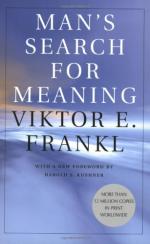
|
| Name: _________________________ | Period: ___________________ |
This quiz consists of 5 multiple choice and 5 short answer questions through "Logotherapy in a Nutshell" (through page 157).
Multiple Choice Questions
1. What kind of outbreak affected the prisoners at the author's camp?
(a) Typhus.
(b) Measles.
(c) A strong seasonal flu.
(d) Scarlet Fever.
2. What kind of neuroses result from existential frustration?
(a) Anxiety neuroses.
(b) Existential neuroses.
(c) Noogenic neuroses.
(d) Depressive neuroses.
3. Why did Frankl have to leave his shoes unlaced?
(a) He was given shoes that were too small.
(b) His socks, though warm, were the wrong size.
(c) He suffered from edema.
(d) He injured his ankle and had a hidden makeshift cast.
4. Why did prisoners try to get to the center of the lines that workers formed in the morning?
(a) To avoid being seen by the SS.
(b) Large blocks of people were always selected from the center, so friends could remain together.
(c) They could neither be punished for arriving early nor beaten for arriving late.
(d) For the warmth in the center of the group.
5. Frankl writes that "every age has its own collective neurosis." What does he characterize as the neurosis of his day?
(a) Anxiety.
(b) Noo-dynamics.
(c) The existential vacuum.
(d) Self-absorbtion.
Short Answer Questions
1. What does the author attempt to describe in this essay?
2. What is the principal question that the author tries to address?
3. What is the "delusion of reprieve"?
4. What kind of statue does Frankl argue should compliment the Statue of Liberty?
5. How did Frankl earn the favor of "The Murderous Capo"?
|
This section contains 402 words (approx. 2 pages at 300 words per page) |

|




